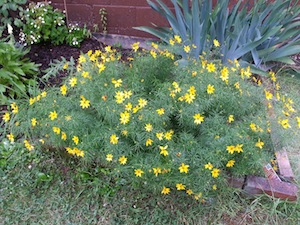The rain won’t stop. The spring and early summer have been a seemingly endless stretch of rain-soaked days. The world has turned relentlessly green. I’ve heard weather-related griping about commuting into the city on rainy morning after rainy morning; wet basements; treacherous roadways; general gloom; cabin fever; oppressive humidity. All worth grumbling about, I suppose. But while others have reached their limit, and can’t take another drop, I, perhaps perversely, have been basking in the life-giving power of the rain, and what it has done for my burgeoning gardens.
Like so much of what is most meaningful in life today, my passion for plant-life grew out of the transformative experience of cancer. In the present, everything I do to tend and care for my gardens is rooted in the energy I devoted to our little backyard on Orianna Street, all those years ago.
I rarely invoke fate, but in hindsight I feel there was some sort of cosmic force, which lead us to the house on Orianna Street, with its secret back garden, where we lived (and nearly died, it felt) during my cancer treatment. I was diagnosed not quite a year and a half after we moved in, and during the springtime of my treatment, our small back plot, with its lovingly planted perennials, became my refuge. I knew nothing about plants when we arrived, but under the tutelage of a wise friend from work and my beautiful neighbor, I slowly learned. But most of what happened was instinctive. We’d been blessed with a gorgeous, miniature oasis, blooming in carefully planned cycles throughout the spring and summer. As I fought this disease, I was driven to help nurture these other living things, to keep them healthy and vibrant. I wasn’t sure I could do it for myself, so at the very least I could do it for them. This tending felt essential to my own survival.
My memories of myself during treatment are of being drained of life and color. I would catch myself in the mirror and see a ghost. Life and color, then, were forces to be treasured, and held sacred. Watering, weeding, deadheading, mulching – all of these became rituals to sustain my flagging spirit. With solemn determination, I would pour my limited reserves of energy into our garden, and then sit back and breathe in its bounty.
Last year, I visited our old neighbors, and learned that our landlords, who had recently moved back into the house on Orianna, had torn out the garden, after the tenants who came after us had cut everything back to make space for keg parties, or something equally blasphemous. From a high window in our old neighbor’s house, I looked down into the yard and saw the newly designed outdoor space, barren of greenery, where the garden used to be. It broke my heart a little bit, but not entirely. For the life from that oasis that nourished me during my darkest days carries on in my own new gardens, just across the river. The irises and coreopsis and sedum that I dug up and transplanted in miniature three years ago have powerfully taken root in new beds, and have been joined by exploding hydrangea, rosemary, loosestrife and day lilies. I continue to find joy and delight in ensuring their health, just as much as I do in taking care of my own.
I love this rain-soaked stretch we are in, as it gives everything I have planted a sweet, sustained drink. There is green everywhere, and splashes of color. There is robust life. Nothing could be more remarkable.


Dear Suzanne,
I am not an elegant writer like you and Emily are, but I can attest to the transformative nature of gardens. I became a gardener during the 35 years i had grass & soil, and I miss it more than anything in my prior life. To touch & dig in the earth was an incredibly powerful connection for me, & to watch plants bloom & care for them was a true labor of love. Planting pots on a porch is not gardening!
I know a woman who worked for many years as a horticulture therapist with patients in physical rehab centers; she just sort of fell into it out of love for it but without any formal education in the field. Maybe one day your experience could serve you–and others–in a second (or third, or retirement) career? Just a thought. This was a delightful read.